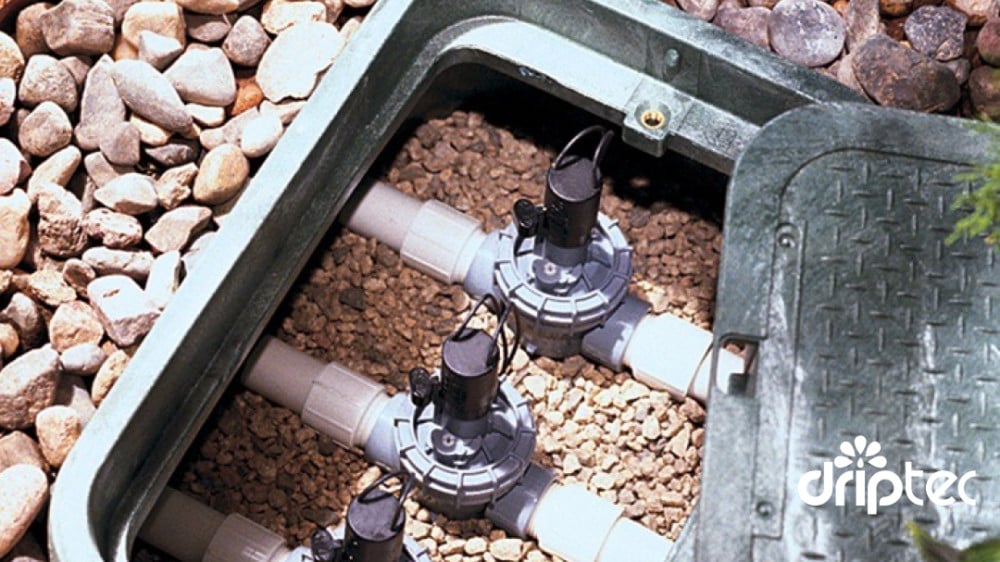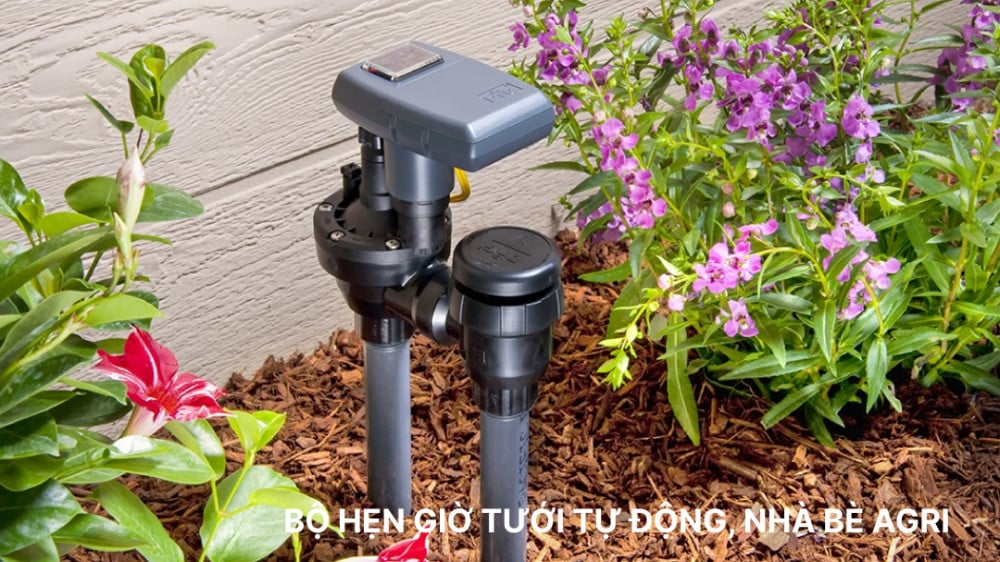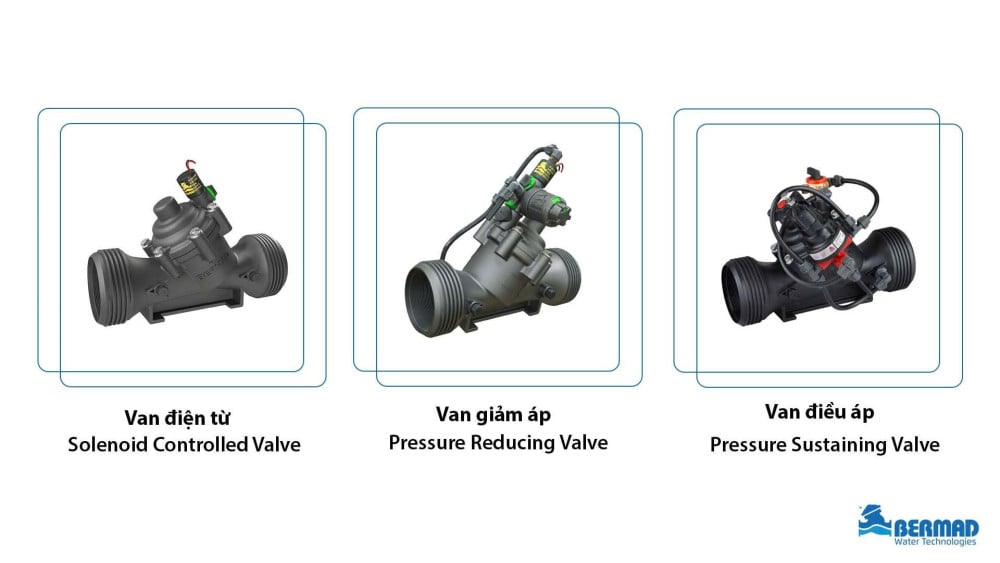This article will analyze in detail the role of Solenoid Valves and Irrigation Timers in automatic irrigation systems, how they work together and the benefits they bring to gardens, from small terraces to large farms.
Solenoid Valve – The Heart of the Automatic Irrigation System
Solenoid valve is a mechanical and electrical combination device, responsible for controlling the water flow in automatic irrigation systems. Made of high-quality plastic or metal, the solenoid valve is capable of withstanding high water pressure (up to 10 bar) and operating stably for a long time. The structure of the valve includes an electromagnet and two water inlet/outlet ports, with a metal core inside that is controlled to open/close the flow.
The role of solenoid valves
* Water flow control: The solenoid valve replaces the traditional manual valve, automatically opening/closing the water source according to the electromagnetic signal from the timer. When receiving the signal, the electromagnet attracts the metal core, allowing water to flow through; when the signal is interrupted, the valve closes, stopping the water flow.
* Irrigation zoning: Each solenoid valve manages an independent irrigation zone, allowing the system to irrigate alternately or individually according to the needs of each plant, helping to save water and optimize irrigation efficiency.
* Increased system durability: High quality solenoid valves, such as products from Israel or Europe, have a durability of up to 7-8 years, withstand outdoor environments and strong water pressure.
Notes when using solenoid valves
* Choose the right size: Valves come in common sizes such as ¾”, 1”, 1.5” (diameter 21, 27, 34mm), and should be selected based on water flow and pressure. Larger valves are suitable for large-area irrigation systems with many nozzles.
* Ensure clean water source: Water containing impurities such as sand, moss can cause valve blockage or damage. A filter must be installed before the valve to protect the device.
* Compatible voltage: Solenoid valves usually use 24V or 12V voltage, need to be combined with a timer with corresponding voltage to ensure stable operation.
Irrigation Timer – The Brain of the Automatic Irrigation System
The irrigation timer is a smart control device that allows programming the on/off time of the irrigation system. With an LCD screen and function buttons, the timer helps users easily set the irrigation schedule according to the desired day, time and duration.
The role of irrigation timer
* Automatic watering schedule: The timer allows setting multiple watering times per day (up to 17 times/day with some models such as ATA TD-03) or weekly cycles. Once set, the system will automatically repeat without intervention.
* Save time and water: Users do not need to water plants manually, especially useful when on business trips or busy. Accurate watering schedule helps provide the right amount of water, avoiding waste.
* Integrating modern technology: Some advanced timers, such as Maka's products imported from Israel, support control via Wi-Fi or phone apps, allowing remote on/off and flexible adjustment.
Advantages of irrigation timer
* Easy to use: Timers like the Tropical TPC-T05 have a user-friendly interface, allowing watering time settings from 1 minute to 23 hours 59 minutes, suitable for many types of plants.
* Energy saving: Many models use AAA or 9V batteries, with a usage time of up to 1 year. Some automatic watering timers integrate solar energy, such as the ATA TDMT-01, which is cost-effective and environmentally friendly.
* Smart features: Features such as “hibernation” mode on rainy days, child lock, or automatic shut-off when battery is low help increase safety and efficiency.
Coordination between solenoid valve and irrigation timer
The solenoid valve and the irrigation timer work as an inseparable pair in the automatic irrigation system. The timer acts as the “brain”, sending an electrical signal to the solenoid valve to control the opening/closing of the water. For example, when it is time to water (for example: 6am), the timer supplies power to the valve, the valve opens to let water flow through the irrigation heads (sprinkler, drip, mist). When the set time is up (for example: 5 minutes), the timer turns off the power, the valve closes, and irrigation stops.
This combination offers the following benefits:
* Proactive and accurate: The irrigation system operates on time, with the right amount of water, ensuring that plants are always fully cared for.
* Diverse applications: Suitable for many irrigation models, from rooftop vegetable gardens, apartment balconies to fruit farms or parks.
* Cost savings: Reduces water and electricity waste, while reducing labor costs compared to manual watering.
The role of Solenoid Valves and Irrigation Timers in automatic irrigation systems is very important. Solenoid valves control the water flow precisely, while the timer automates the irrigation schedule, ensuring lush plants without frequent intervention. Modern technology integrates smart features, suitable for all types of gardens. Investing in a quality irrigation system helps save time, water and improve the efficiency of plant care./.
Contact Nha Be Agri: No. 25, Ngan Long Villa Area, Nguyen Huu Tho Street, Phuoc Kien Commune, Nha Be District Phone: 19002187 Email: [email protected] |
AT
Source: https://baolongan.vn/vai-tro-van-dien-tu-va-bo-hen-gio-tuoi-trong-he-thong-tuoi-tu-dong-a193763.html






![[Photo] General Secretary To Lam receives First Deputy Secretary General of the African National Congress (ANC) of South Africa](https://vphoto.vietnam.vn/thumb/1200x675/vietnam/resource/IMAGE/2025/5/20/bb2999907e1245d5b4c7310a890d8201)


























![[Photo] Vietnamese shipbuilding with the aspiration to reach out to the ocean](https://vphoto.vietnam.vn/thumb/1200x675/vietnam/resource/IMAGE/2025/5/20/24ecf0ba837b4c2a8b73853b45e40aa7)
![[Photo] Award ceremony for works on studying and following President Ho Chi Minh](https://vphoto.vietnam.vn/thumb/1200x675/vietnam/resource/IMAGE/2025/5/20/a08ce9374fa544c292cca22d4424e6c0)

































































![[VIDEO] - Enhancing the value of Quang Nam OCOP products through trade connections](https://vphoto.vietnam.vn/thumb/402x226/vietnam/resource/IMAGE/2025/5/17/5be5b5fff1f14914986fad159097a677)
Comment (0)